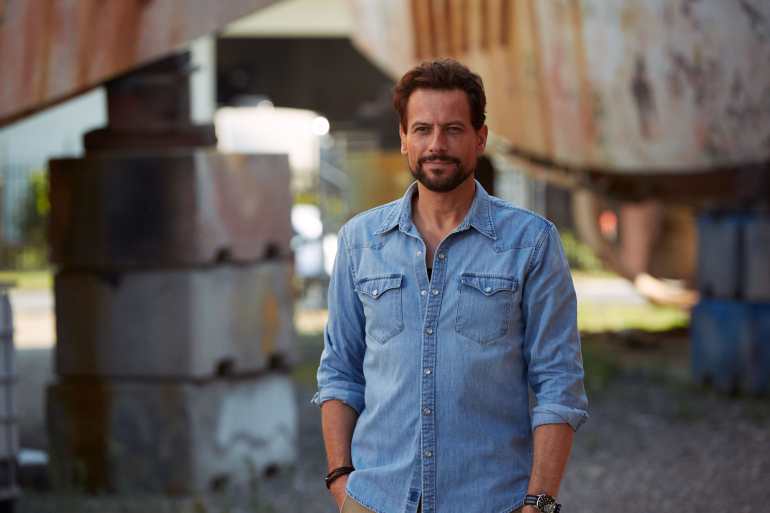Ioan Gruffudd in ‘Harrow’.
Released today, the COVID-Safe Guidelines developed by the Australian Screen Sector Task Force set the stage for an imminent return to screen production – but only after travel restrictions are eased and the insurance risk issue is solved.
The 41-page document is designed to help producers eliminate and minimise the risks associated with exposure of personnel to COVID-19 as production resumes.
The task force comprised reps of Screen Australia, Screen Producers Australia, the MEAA, AFTRS, state agencies, guilds, the ABC, SBS, Ausfilm and a number of production companies.
Screen Australia CEO Graeme Mason said, “These guidelines are an essential tool to help the Australian industry get back to the business of creating world-leading screen stories. Whilst each production will need to have their own individual plan, we hope that the COVID-Safe Guidelines will help inform practitioners on what they need to be considering before they get back up and running.”
However Mason expects the budgets of dramas will go up significantly to cover the costs of making sets COVID-19-safe, and that will also mean the volume of filming each day will drop.
“There will be potentially massive additional costs for most scripted productions,” he tells IF. “I expect all federal and state funding bodies and networks will have to fund fewer things because potentially they will all cost more. That’s even before you factor in if there is overage for a shutdown or slow down, let alone an insurance issue.”
Mason added that Screen Australia’s immediate priority is to help get productions that had been suspended up and running.
The guidelines, which address such subjects as duties under Work Health and Safety laws, risk management, control measures and incident management, were drawn up in consultation with the federal Department of Health and law firm Clyde & Co.
SPA CEO Matt Deaner hailed the document as an important milestone in returning to the production of quality Australian content and the ability to capitalise on export opportunities.
The pandemic has disrupted 120 productions, affecting more than 30,000 employees, freelancers and contractors, and caused estimated damage to the sector of more than $2 billion, according to SPA.
Today SPA backed calls by CJZ’s Nick Murray and See-Saw Films’ Emile Sherman urging the government to cover the COVID-19 risk, warning: “Without some form of assistance, production activity will stall, despite the best efforts and innovation of production businesses.”
Communications Minister Paul Fletcher has acknowledged this is a key issue and he has asked his department and Screen Australia for advice, while noting this would require a whole-of-government response as a number of sectors are affected.
Deaner reiterated his criticism of the temporary suspension of the commercial free-to-air networks’ local content quotas and the lack of transparency surrounding the government’s decision.
Noting that production has continued on children’s animation and documentaries and the imminent resumption of other productions, Deaner said: “A blanket suspension in 2020 makes no sense and the decision should be reversed. All it does is smother commissioning demand at a time when the industry needs it more than ever.”
Hoodlum Entertainment is keen to resume filming season two of Network 10’s Five Bedrooms in Melbourne and season 3 of the ABC’s Harrow in Queensland.
First, it needs the government’s help to be able to bring back Harrow’s Ioan Gruffudd from Los Angeles and co-star Miriama Smith from New Zealand, and the lifting of interstate travel restrictions.
“Our team is doing their very best to expedite the process so we can get moving as soon as possible,” Hoodlum’s Nathan Mayfield told IF.
Mason says: “We are providing support to productions on any issue which is stopping them from completing, and making any assistance we can to federal and state governments.”
Fremantle led the world when it resumed shooting Neighbours in Melbourne using strict health and safety protocols. Chris Oliver-Taylor, Fremantle CEO Asia-Pacific, said: “We have been thrilled to work with AFTRS as we all look to restart the industry, which can only be a great thing for audiences and the economy.”
AFTRS CEO Nell Greenwood said: “The number one priority of the Task Force is the safety and well-being of production teams and those who work with them. The guidelines have been an incredible collaborative effort across the industry and are a significant step in getting screen production back on the road to recovery.”
MEAA CEO Paul Murphy said: “The safety of everyone working on productions is paramount as the industry prepares to get back to work. While these Guidelines have been drawn up collaboratively and with the best intentions of all stakeholders, the industry will need to be hyper-vigilant to ensure they are implemented thoroughly.
“This is a time for employers, government and union members to work together to ensure that workers are safe as we create the entertainment Australians love.”


